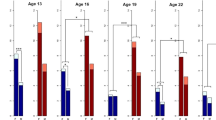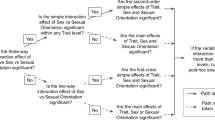Abstract
The same-sex and opposite-sex friendship patterns of men and women students from two first-year psychology classes at the University of Waikato in New Zealand were examined. A friendship questionnaire previously used in the United States of America was administered to compare results of the two cultures. Findings from this study support American research suggesting that women are more intimate and emotional in their same-sex friendships than men, and tend to place a higher value on these friendships than men do. In accordance with findings of the American sample, New Zealand women emphasized talking, emotional sharing, and discussing personal problems with their same-sex friends, and men showed an emphasis on sharing activities and doing things with their men friends. Differences between the American and New Zealand samples were shown for men in the number of friends and the intimacy levels of these friendships. New Zealand men preferred numerous but less intimate same-sex friends, while women (as in the United States) showed a preference for a few, close, intimate same-sex friends. Men, in contrast to women, derived emotional support and therapeutic value more from their opposite-sex relationships than their same-sex friendships. Finally, more men than women stated they would not cancel an engagement with an opposite-sex friend in order to go out with a same-sex friend. Results are interpreted as suggesting a need for changes in the current socialization process of males who are taught to repress their emotions and form rather less intimate and possibly less beneficial same-sex friendships than women.
Similar content being viewed by others
References
Aries, E., & Johnson, F. Close friendship in adulthood: Conversational content between same-sex friends. Sex Roles, 1983, 9, 1183–1196.
Balswick, J., & Peck, C. The inexpressive male: A tragedy of American society. Family Coordinator, 1971, 20, 363–368.
Bardwick, J. The psychology of women: A study of bicultural conflicts. New York: Harper & Row, 1971.
Becker, W. Consequences of different kinds of parental discipline. In M. Hoffman & L. W. Hoffman (Eds.), Review of child development research, 1. New York: Russell Sage Foundation, 1964.
Bell, M. Fifteen-minute spot-checks of the involvement of children in activities in kindergartens, presented in chart form. In Education and the Equality of the Sexes report, Department of Education, Wellington, 1975.
Bell, R. Friendships of women and of men. Psychology of Women Quarterly, 1981, 5(3), 402–417.
Bernard, J. The female world. New York: The Free Press, 1981.
Bronfenbrenner, U. The changing American child: A speculative analysis. Merrill-Palmer Quarterly, 1961, 7, 73–83.
Caldwell, M., & Peplau, L. Sex differences in same sex friendship. Sex Roles, 1982, 8, 721–732.
Caplan, P., & Bujra, J. Women united, women divided. Comparative studies of ten contemporary cultures. Bloomington, IN: Indiana University Press, 1979.
Carkhuff, R. R. The art of helping, 5th ed. Amherst, MA: Human Resource Development Press, 1983.
Cherry, L., & Lewis, M. Mothers and two-year olds: A study of sex-differentiated aspects of verbal interaction. Developmental Psychology, 1975, 12, 278–282.
Cozby, P. Self-disclosure: A literature review. Psychological Bulletin, 1973, 79, 73–91.
Davidson, S., & Packard, T. The therapeutic value of friendship between women. Psychology of Women Quarterly, 1981, 5, 495–510.
Donnelly, F. Big boys don't cry. Auckland: Cassell, 1978.
Douvan, E., & Adelson, J. The adolescent experience. New York: Wiley & Sons, Inc., 1966.
Goldberg, H. The hazards of being male: Surviving the myth of masculine privilege. New York: Signet, 1976.
Goldberg, S., & Lewis, M. Play behavior in the year-old infant. Early sex differences. Child Development, 1969, 40, 21–31.
Komarovsky, M. Blue-collar marriage. New York: Vintage, 1967.
Lefkowitz, M., Huesmann, L., & Eron, L. Parental punishment, a longitudinal analysis of effects. Archives of General Psychiatry, 1978, 35, 186–191.
Lewis, R. A. Emotional intimacy among men. Journal of Social Issues, 1978, 34, 108–121.
Lewis, M., & Freedle, R. Mother infant dyad: The cradle of meaning. In P. Pliner, L. Kramer, & T. Alloway (Eds.), Communication and affect: Language and thought. New York: Academic Press, 1973.
Maxwell, G. Behaviour of lovers: measuring the closeness of relationships. Journal of Social and Personal Relationships, 1985, 2, 215–237.
Mulhern, R., & Passman, R. Parental discipline as affected by the sex of the parent, the sex of the child, and the child's apparent responsiveness to discipline. Developmental Psychology, 1981, 17, 604–613.
Pleck, J. The male sex role: Definitions, problems and sources of change. Journal of Social Issues, 1976, 32, 155–164.
Powers, E., & Bultena, G. Sex differences in intimate friendships in old age. Journal of Marriage and the Family, 1976, 38, 739–747.
Resnik, J., & Amerikaner, M. Self-disclosure. In R. Woody (Ed.), Encyclopaedia of clinical assessment. New York: Jossey, 1979.
Ritchie, J., & Ritchie, J. Child rearing practices in New Zealand. Wellington: A. H. & A. W. Reed, 1970.
Ritchie, J., & Ritchie, J., Growing up in New Zealand. Sydney: George Allen & Unwin, 1978.
Ritchie, J., & Ritchie, J. Spare the rod. New York: George Allen & Unwin, 1981.
Rubin, L. B. Just friends. The role of friendship in our lives. New York: Harper & Row, 1985.
Sears, P., Maccoby, E., & Levin, H. Patterns of child rearing. Evanston, IL: Row, Peterson, 1957.
Seiden, A., & Bart, P. Woman to woman: Is sisterhood powerful?, In Glazer-Malbin, N. (Ed.), Old family/new family. New York: Litton Educational Publishing Inc., 1975.
Serbin, L., O'Leary, K., Kent, R., & Tolnick, I. A comparison of teacher response to the preacademic and problem behaviour of boys and girls. Child Development, 1973, 44, 776–804.
Weitzman, L. Sex role socialization. CA: Mayfield Publishing Co., 1979.
Williams, D. Gender, masculinity-femininity, and emotional intimacy in same-sex friendship. Sex Roles, 1985, 12, 587–600.
Author information
Authors and Affiliations
Rights and permissions
About this article
Cite this article
Aukett, R., Ritchie, J. & Mill, K. Gender differences in friendship patterns. Sex Roles 19, 57–66 (1988). https://doi.org/10.1007/BF00292464
Issue Date:
DOI: https://doi.org/10.1007/BF00292464




